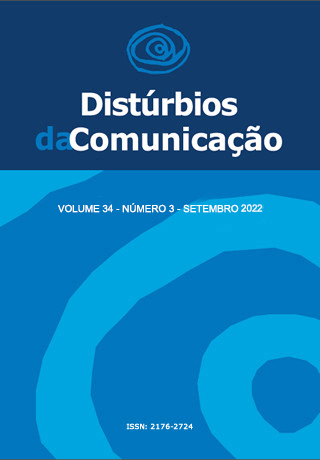Theater Activities
Contributions to the pragmatic development in children’s language
DOI:
https://doi.org/10.23925/2176-2724.2022v34i3e51726Keywords:
Speech Therapy, Language, Language development, Children’s languageAbstract
Introduction: The process of acquisition and development of language skills occurs from the interaction between neurobiological and environmental aspects. Scholars believe that theater, being an art that stimulates the most varied expressions, favors this process. Objective: To investigate the influence of theater activities on children’s linguistic development at the pragmatic level of language. Methods: Observation of ten students of a private school located in São José - Santa Catarina, aged between five and seven years old, organized in a research group (GP) and a comparative group (CG). The research was conducted in three phases: evaluation, intervention and reassessment. In the first phase, which took place at the beginning of the school year, both groups were subjected to a pragmatic evaluation through the Children’s Language Test - ABFW - part D. The intervention phase, during which the GP students participated in drama classes, was implemented throughout the course of the school year. At the end of the school year, in the third phase of the research, both groups were evaluated with the same methodological rigor applied in the first stage. Results: It was found that GP students exhibited better performance in the linguistic competence in the post-intervention period when compared to the CG students. Conclusion: Drama classes can stimulate pragmatic skills and children’s language development.
Downloads
References
Puglisi ML, Befi-Lopes DM. Impact of specific language impairment and type of school on different language subsystems. Rev CoDAS. 2016; 28(4): 388-394. https://doi.org/10.1590/2317-1782/20162015242.
Carvalo AJA, Lemos SMA, Goulart LMHF. Language development and its relation to social behavior and family and school environments: a systematic review. Rev CoDAS 2016; 28(4): 470-479. https://doi.org/10.1590/2317-1782/20162015193.
Fattore IM, Uhde RM, Oliveira LD, Roth AM, Souza APR. Comparative analysis of initial vocalizations of preterm and full-term infants with and without risk for development. Ver CoDAS. 2017; 29(4): e20160075. http://dx.doi.org/10.1590/2317-1782/20172016075.
Alves JMM, Carvalho AJA, Pereira SCG, Escarce AG, Goulart LMHF, Lemos SMA. Association between language development and school environment in children of early childhood education. Distúrbios da Comunicação. 2017; 29(2): 342-353. https://doi.org/10.23925/2176-2724.2017v29i2p342-353
Panes ACS, Corrêa CC, Weber AT, Maximino LP. Risk factors for language development: attitudes of health and education professionals. J Health NPEPS.2018; 3(1): 185-197. http://dx.doi.org/10.30681/252610102738.
Dias NM, Bueno JOS, Pontes JM, Mecca TP. Oral and written language in Infant Education: relation with environmental Variables. Psicologia Escolar e Educacional.2019; v.23: e178467.http://dx.doi.org/10.1590/217535392019018467.
Stuchi RF, Nascimento LT, Bevilacqua MC, Neto RVB. Oral language in children with a five years of use cochlear implant. Rev Pró Fono. 2007; 19 (2): 167-176. http://dx.doi.org/10.1590/S0104-56872007000200005.
Duarte CP, Veloso RL. Linguagem e comunicação de pessoas com deficiência intelectual e suas contribuições para a construção da autonomia. Rev Inclusão Social. 2017; 10 (2): 88-96.
Balestro JI, Fernandes FDM. Caregivers’ perception of children with Autism Spectrum Disorder regarding to the communicative profile of their children after a communicative orientation program. CoDAS 2019; 31(1): e20170222. https://doi.org/10.1590/2317-1782/20182018222.
Wiethan FM, Mota HB, Moraes AB. Correlations between vocabulary and phonological acquisition: number of words. Rev CoDAS. 2015; 379–387. https://doi.org/10.1590/2317-1782/20162015108.
Glória YAL, Hanauer LP, Wiethan FM, Nóro LA, Mota HB. The use of conjunctions by children with typical language development. Rev CoDAS. 2015; 28(3): 221-225. https://doi.org/10.1590/2317-1782/20162015107.
Moretti CAM, Ribas A. Desenvolvimento de linguagem e sua relação com a perda auditiva. Rev Tuiuti: Ciência e Cultura. 2016; 4 (52): 83-95.
Miotto EC, Lucia, MCS, Scaff, M. Neuropsicologia Clínica. São Paulo: Roca, 2012. p. 3-20.
Souza VC, Dourado JS, Lemos SMA. Phonology, auditory processing and childhood education: environmental influences on the development of children aged from 4 years to 5 years and 11 months. Rev CEFAC. 2015; 17(2): 512-520. http://dx.doi.org/10.1590/1982-0216201516513.
Brasil. Ministério da Educação e do Desporto. Secretaria de Educação Fundamental. Referencial curricular nacional para a educação infantil /Ministério da Educação e do Desporto, Secretaria de Educação Fundamental. — Brasília: MEC/SEF, 1998.3v.: il.
Brasil. Secretaria de Educação Fundamental. Parâmetros curriculares nacionais: introdução aos parâmetros curriculares nacionais / Secretaria de Educação Fundamental. – Brasília : MEC/SEF, 1997. 126p.
Koehler R, Gonçalves MB, Gonçalves JC. Teatro e Performance na Educação Infantil:[cor] possibilidades para uma educação sensível. Rev Teias. 2018; 19 (52): 121-136. https://doi.org/10.12957/teias.2018.29255.
Barros MSF, Paschoal JD, Ferreira AL, Barros PCS. Art and education: the theater as a methodological resource in pedagogical work in literacy. Rev RIAEE. 2019; 14(3): 1205-1216. https://doi.org/10.21723/riaee.v14i3.12491.
Blanco YMC, Bocajá AMM, Huerta EP, Zipaquirá JAG. El teatro como potenciador del desarrollo infantil y los procesos neuropsicológicos [trabalho de conclusão de especialização]. Bogotá: Alejandría repositorio comunidad. 2019.
Andrade CRF, Befi Lopes DM, Fernandes FDM, Wertzner HF. ABFW: Teste de linguagem infantil nas áreas de Fonologia, Vocabulário, Fluência e Pragmática. 2ed. São Paulo: Pró-Fono, 2004. p. p.83-97.
Rogers SJ, Dawson G, Vismara LA. Autismo: Compreender e agir em família. Lisboa: Lidel; 2015. O triângulo da atenção conjunta: partilhar interesses com os outros; p. 213-235.
Sanchotene C, Agostine A, Rabenschlag P, Gauvagni S. Buiuding Value Though Community Communition and Theather in School Environment. Acervo online de Mídia Regional. 2016; 11 (1): 3-18.
Ramos AP, Bortagarai FM. Non-verbal communication in the health area. Rev CEFAC. 2011; 14 (1): 164-170. http://dx.doi.org/10.1590/S1516-18462011005000067.
Zappa P, Santos BLD. Jogos teatrais na escola: uma possibilidade de auxílio no desenvolvimento biopsicossocial e cognitivo da criança. Rev ECCOM. 2019; 10 (19): 149-162.
Costa GM, Rossi NF, Giacheti CM. Performance of Brazilian Portuguese speakers in the Test of Narrative Language (TNL). Rev CoDAS. 2018; 30(4): e20170148. http://dx.doi.org/10.1590/2317-1782/20182017148.
Silveira HG, Brocchi BS, Perissinoto J, Puglisi ML. Tutoring effects in the narrative skills of typically developing children. Rev CoDAS. 2019; 31(2): e20180022.http://dx.doi.org/10.1590/23171782/20182018022
Rossi NF, Lindau TA, Gillam RB, Giacheti CM. Cultural adaptation of the Test of Narrative Language (TNL) into Brazilian Portuguese. Rev CoDAS. 2016; 28 (5): 507-516. http://dx.doi.org/10.1590/2317-1782/20162016018.
Downloads
Published
Issue
Section
License
Copyright (c) 2022 Greicyhelen Santos da Cruz, Luciane Mari Deschamps, Helena Ferro Blasi, Aline Mara Mara de Oliveira

This work is licensed under a Creative Commons Attribution 4.0 International License.









